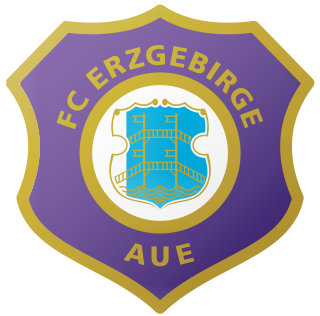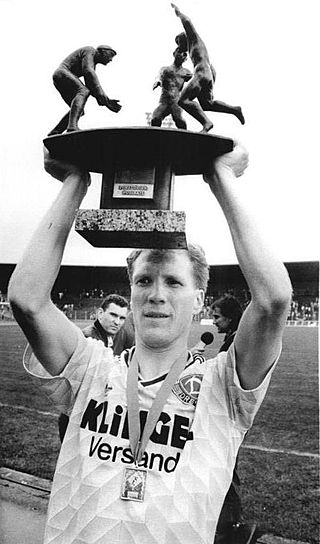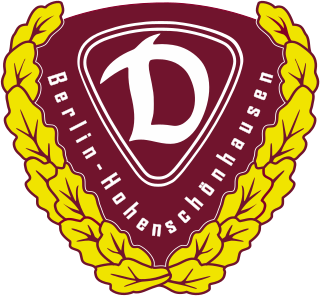
The DDR-Oberliga was the top-level association football league in East Germany.

Fußball Club Erzgebirge Aue e.V., commonly known as simply FC Erzgebirge Aue or Erzgebirge Aue, is a German football club based in Aue-Bad Schlema, Saxony. The former East German side was a founding member of the 3. Liga in 2008–09, after being relegated from the 2. Bundesliga in 2007–08. The city of Aue-Bad Schlema has a population of about 20,800, making it one of the smallest cities to ever host a club playing at the second highest level of German football. However, the team attracts supporters from a larger urban area that includes Chemnitz and Zwickau, whose own football sides are among Aue's traditional rivals.

The FDGB-Pokal was an elimination football tournament held annually in East Germany. It was the second most important national title in East German football after the DDR-Oberliga championship. The founder of the competition was East Germany's major trade union.

The football league system of the German Democratic Republic existed from 1949 until shortly after German reunification in 1991.
The 1954–55 DDR-Oberliga was the sixth season of the DDR-Oberliga, the first tier of league football in East Germany. After the 1954–55 season the league played a transition round in autumn 1955, followed by five seasons, until 1960, where it played in the calendar year format. From 1961–62 onwards the league returned to its traditional format.
The 1956 DDR-Oberliga was the eighth season of the DDR-Oberliga, the first tier of league football in East Germany. Rather than in the traditional autumn-spring format the Oberliga played for six seasons from 1955 to 1960 in the calendar year format, modelled on the system used in the Soviet Union. From 1961–62 onwards the league returned to its traditional format.
The 1959 DDR-Oberliga was the eleventh season of the DDR-Oberliga, the first tier of league football in East Germany. Rather than in the traditional autumn-spring format the Oberliga played for six seasons from 1955 to 1960 in the calendar year format, modelled on the system used in the Soviet Union. From 1961–62 onwards the league returned to its traditional format.
The 1963–64 DDR-Oberliga was the 15th season of the DDR-Oberliga, the first tier of league football in East Germany.

SG Dynamo Hohenschönhausen was an East German sports community from Berlin, affiliated to SV Dynamo. The sport community offered a wide range of sports. Its football departement was active from 1953 and until 1966.
A sports club (SC) was a specially promoted sports club for elite sport in the East German sports system. The sports clubs emerged in East Germany after 1954. They were originally founded by the so-called sports associations (SV), which served as umbrella organizations for the sports communities (SG) or enterprise sports communities (BSG) of the different trade union areas in East Germany. The East German sports management then tightened up the system in the early 1960s and instead set up regional district sports clubs. The sports clubs existed in this form until the end of 1990, when they were either dissolved or given new legal statuses based on the West German model. The system of sports clubs came to prove itself in view of the very large number of medals that athletes in East Germany won in the Olympic games and in European and World Championships.
The DDR-Bestenermittlung was the unofficial and amateur second level ice hockey league in East Germany from 1971–1990.
The 1951–52 DDR-Oberliga season was the fourth season of the DDR-Oberliga, the top level of ice hockey in East Germany. Seven teams participated in the league, and Chemie Weißwasser won the championship.
The 1955–56 DDR-Oberliga season was the eighth season of the DDR-Oberliga, the top level of ice hockey in East Germany. Four teams participated in the league, and SG Dynamo Weißwasser won the championship.
The 1956–57 DDR-Oberliga season was the ninth season of the DDR-Oberliga, the top level of ice hockey in East Germany. Six teams participated in the league, and SG Dynamo Weißwasser won the championship.
The 1966–67 DDR-Oberliga season was the 19th season of the DDR-Oberliga, the top level of ice hockey in East Germany. Eight teams participated in the league. SG Dynamo Weißwasser and SC Dynamo Berlin won the championship.
The 1969–70 DDR-Oberliga season was the 22nd season of the DDR-Oberliga, the top level of ice hockey in East Germany. Seven teams participated in the league, and SG Dynamo Weißwasser won the championship.
The 1988–89 DDR-Oberliga season was the 41st and final season of the DDR-Oberliga, the top level of ice hockey in East Germany. Two teams participated in the league, and SG Dynamo Weißwasser won the championship.




